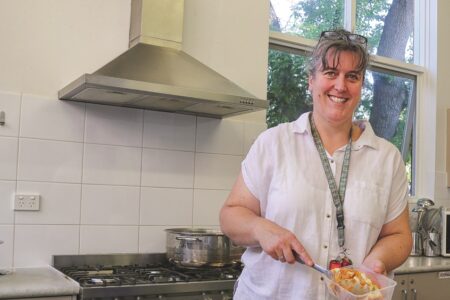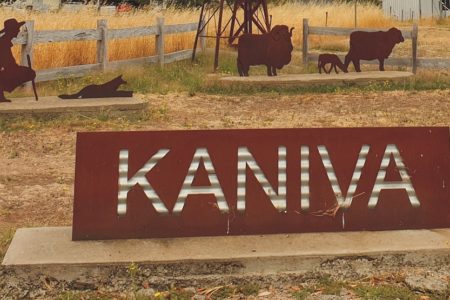By Andrew Humphries
It’s 10am on a beautiful Melbourne day in late November and Boroondara Community Outreach in Kew is a hive of activity.
Volunteers are busy in the kitchen cooking meals for distribution, in another room boxes of produce are being sorted into bags for delivery to needy families and individuals while, elsewhere, loaves of donated bread are being sorted.
At the centre of this organised chaos is Minister, co-ordinator and, as she likes to describe herself, chief cook and bottle washer, Natalia Dixon-Monu.
Time is of the essence on this Monday morning, and as the clock ticks over to 11am Natalie and her volunteers throw open the doors to those wanting to take home pre-cooked meals and other produce items.
Already, some participants have been gathered in the laneway next to BCO for some time, ready to collect plastic containers of wonderful food cooked with love, and boxes of produce, which will get them through the next week.
Among them is 69-year-old Kay Gross, who suffered a brain injury in 1993 and has been coming to BCO for many years.
Quite simply, she says, BCO and its team of dedicated volunteers are her lifeline.
During her regular visits, Kay always takes home containers filled with fantastic food prepared by the kitchen volunteers.
And while those meals are important for Kay, who has never learnt to cook, BCO offers her more than just the nourishment of food.
“What makes BCO so great is its inclusiveness and the fact that everyone is accepted,” she says.
“There is a real sense of community and I love the people here because you are accepted for who you are.”
Talk to BCO’s participants and you will hear that word “community” quite a bit: the sense of community that BCO offers to people, but also its place in the Kew community, helping those less fortunate since 1993.
Back then, research showed that the city of Boroondara had the second highest rate of rooming houses in Melbourne, second only to Port Phillip.
It was pretty obvious then, says Natalie, that something needed to be put into place to assist those people on the margins who, all too often, were ignored by the more mainstream community services.
This is Natalie’s second stint at BCO – the first time she did five years and this time around she has clocked up nine years in what is an obvious labour of love.
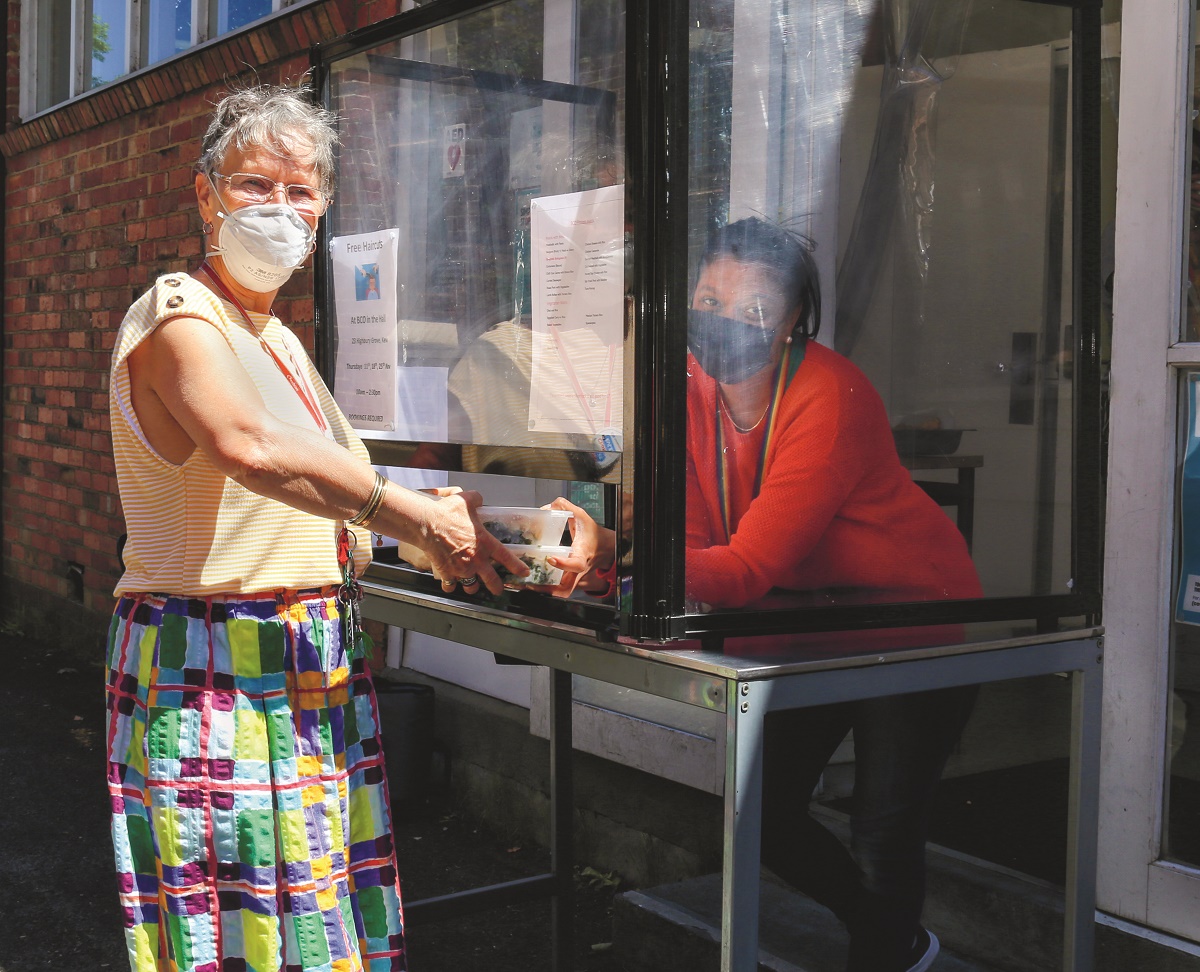
Kay Gross receives some pre-cooked meals from Niranga Jayasekera at BCO.
As the morning unfolds, she is a whirlwind of energy, helping in the kitchen at one point, the next minute talking to a participant about a particular issue he has, while answering phone calls and helping someone else deal with an issue online.
It’s ridiculously busy, but Natalie wouldn’t have it any other way, though, as BCO and what it represents as a Christian community service to its participants is something very dear to her heart.
Go to BCO’s website and a quote on its home page tells you all you need to know about that provision of community service.
“We support people who are socially isolated or living with a mental illness to live with dignity and engage in community,” the quote says.
Asked to expand on that, Natalie stresses the words “dignity” and “community” to encapsulate what BCO offers its participants.
“We support vulnerable people who sometimes don’t get treated with much dignity, within the broader community or within health services, and who are sometimes reduced to being a ‘mentally ill person’, rather than ‘a person’,” Natalie says.
“So the filter of engagement for them is very much through the filter of their illness, whereas we at BCO say we are about trying to get people to engage in community.
“What we do is act as a facilitating space for community, in the sense that we don’t see ourselves necessarily as putting on programs for people, it’s very much about doing things with people, rather than for them.
“We talk about creating community for people and recognising their gifts and what they bring.
“It is very much about having that compassion but also that nurturing of creativity, so we also do a lot of stuff around art and music and drama, because that is all about expressing our humanity.
“The other aspect of it is around hospitality, about providing hospitality in the sense of sitting down and breaking the bread together. So the meal is a gift of yourself, as well as the food.”
As the day rolls on at BCO, long-time participant Leigh Johnstone arrives to collect two boxes of produce to take home to his wife Helen, and three children under the age of eight.
Helen is from Papua New Guinea and some issues around her visa status has meant Leigh required some help from Natalie to deal with ongoing paperwork.
When she sees Leigh, there is a chance for Natalie to say a quick hello and ask how everything has gone with getting the paperwork off to the appropriate department.
“All good, thanks Natalie,” says Leigh with a huge smile and two thumbs up.
Leigh has been coming to BCO since 2012 and can’t sing its praises highly enough.
“It’s a huge help and we couldn’t do without it,” he says.
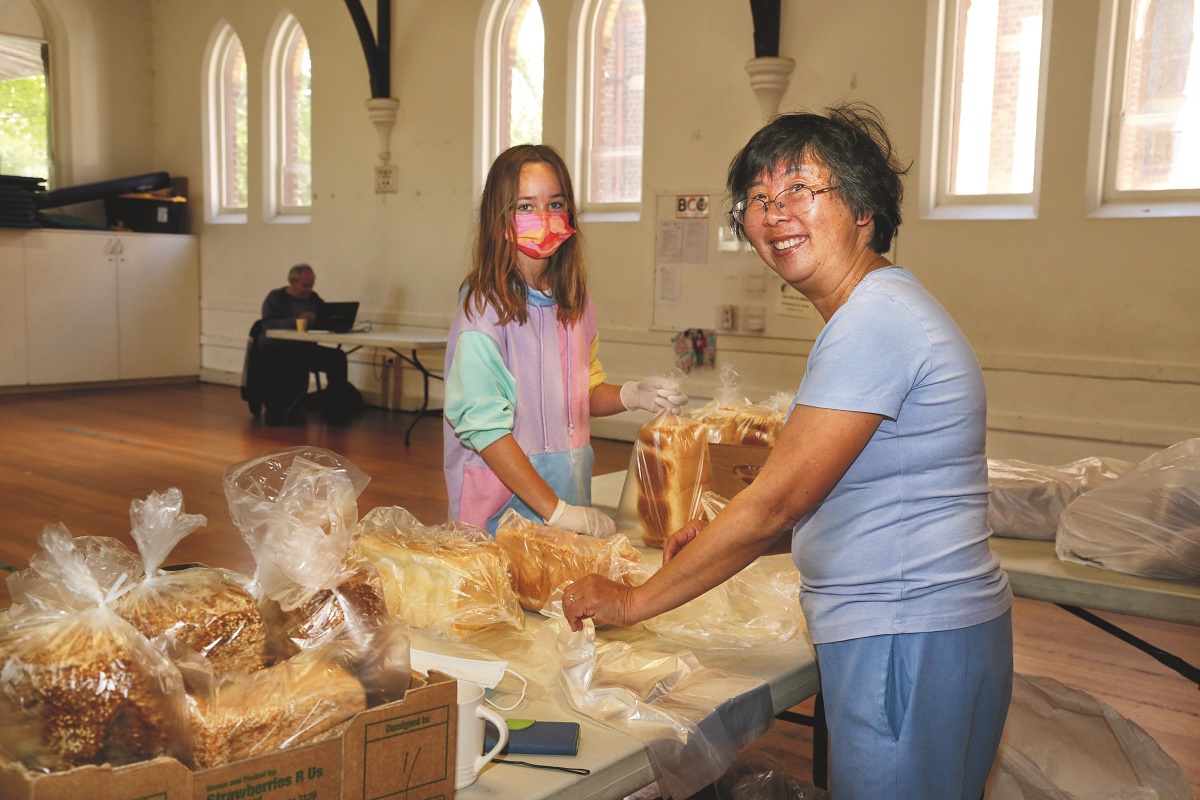
Volunteers Voon Stokie and Olivia Jackson sort through donated bread.
And while donations of food and other items are important, just like Kay, Leigh regards the sense of community created by Natalie and the volunteers as one of BCO’s biggest strengths.
“Natalie knows how to handle everyone who comes in,” he says.
“She is a peacemaker who looks out for everyone and she is part of a great team here.”
Given some of the issues faced by many of the participants, the role of peacemaker is one Natalie is called upon to fill occasionally, and a background working in adult and juvenile prisons, experience in family support and youth work, as well as tertiary education degrees, mean she is more than equipped for the role.
“Oh yes, that background has helped absolutely, because in all of those places I have been learning, and all of that comes into play at BCO,” Natalie says.
“So here I’m both the Minister and co-ordinator, but what I do is right across the board, everything from pastoral care to doing grant applications.
“There is the financial side of it and the community engagement side, also some networking, just about everything you can think of.
“I can be everything from chief cook one minute to emptying out the bins because recycling stuff has been put in the wrong ones, or unblocking the toilet or drain.
“If it’s broken I have to fix it, in between leading worship.
“There isn’t much we don’t do at BCO and, if we can’t do it, I can usually source it from somewhere else.
“People turn up and it’s a case of assisting them with whatever they might need help with, from filling out a form or providing a Zoom session for telehealth purposes, to contacting a phone company in an advocacy role because something has gone wrong with someone’s phone, dealing with bills or helping someone around a school issue with one of their children.
“A lot of these people simply can’t do some of these things because as soon as they get on the phone they get confused because they are anxious, or they end up yelling, so they get banned from somewhere like Centrelink, and it’s very difficult for them.”
If life wasn’t busy enough at BCO, the coming of COVID-19 pushed things to a new level, as Natalie and her team dealt with an unprecedented level of need.
“We saw the worst and best of humanity during the pandemic,” she says.
“It ranged from the incredible selfishness of people hoarding (supermarket items) to the incredible generosity of people who purchased goods and gave them to our emergency relief, and it showed me that not much has changed since the beginning of time.
“We have great capacity for good and great capacity for bad.”
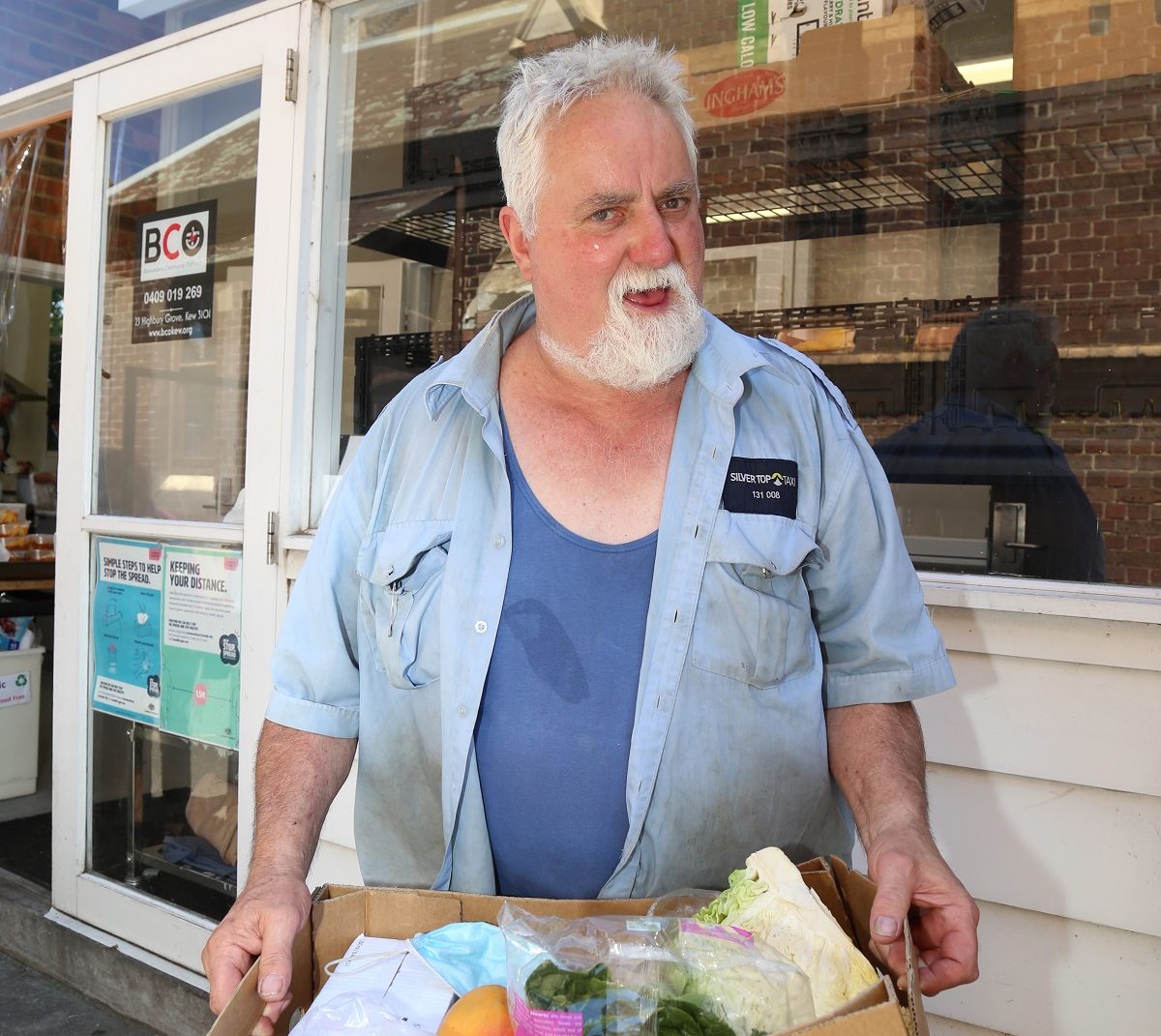
Leigh Johnstone and his family are grateful for the support they receive from BCO.
What the pandemic taught us, hopes Natalie, was recognition by the community of the struggle that BCO participants face on a daily basis as part of everyday life.
“I wrote a Facebook post at one point about isolation (during lockdown) and how a lot of people were now witnessing what people who use BCO experience every day,” she says.
“That disconnect and isolation they feel comes because of their illness, but for everyone else it was isolation that was dictated by the pandemic.”
Before COVID-19, BCO would provide about 500 meals a month to participants, but this increased to more than 500 meals a week as the pandemic hit participants hard.
“What became very evident very quickly early on was the level of distress felt by a lot of people around the fact that they couldn’t get to the shops,” Natalie says.
“You are talking about low-income people who normally go to the shop every second day to get food because they don’t have big fridges and don’t have the capacity to buy in bulk.
“So they were going every couple of days and couldn’t buy anything and they were so freaked out and stressed by this, so we said to them ‘we will provide food’ and we figured the best way to show care for them was to prepare healthy food for them.
“This meant their immune system would be as strong as possible to fight COVID-19 if they caught it, and it also meant they could stay at home and only come out once to pick up food from us.
“So they would come and get enough food for a week and that was how we were able to keep them safe and well.
“And for some of these people, we were their only connection during the week because they weren’t connecting with anyone else at all.”
A large part of that connection was built through food, and Natalie is proud of the high standards set in the BCO kitchen, despite the pitfalls of operating during the many difficulties caused by COVID-19.
“A lot of people were saying ‘this is the best we’ve eaten in years’,” she says.
“There was one homeless guy who had been coming to BCO on a regular basis and then he disappeared for a while and when I saw him again I asked him where he had been, and he said he had gone back into the city.
“So I said to him that he really needed to be accessing support services in the CBD because of the 5km rule that was in place at the time, but he said ‘I have been doing that, but there is no love in their food, it’s not like the great food here’.
“We really do give people the best, it’s not a case of beggars can’t be choosers, because there is no dignity in that approach.
“These are home-cooked meals that are cooked with a lot of love and I think the participants appreciated the fact that during a pandemic there were people prepared to come in and cook for them.”
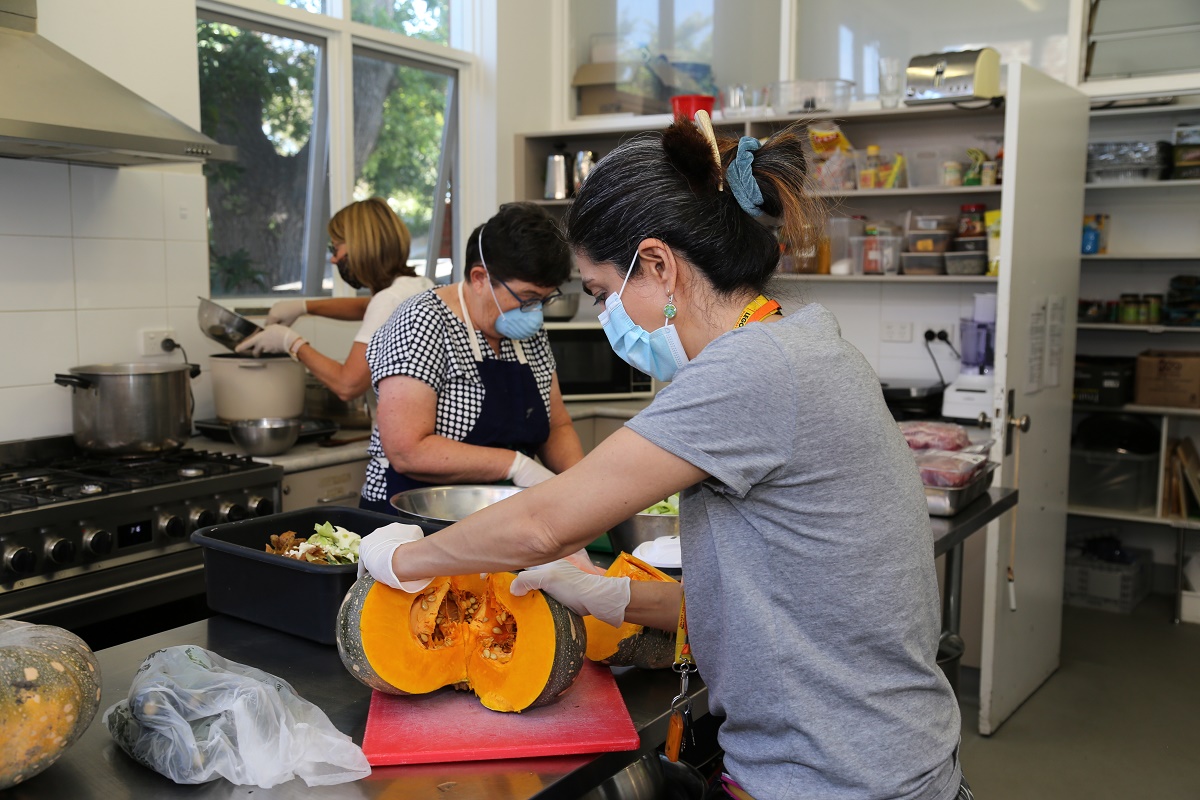
The kitchen is a hive of activity as BCO staff cook delicious meals to be handed out to participants.
While she has had to dig deep at times, a sense of perspective has allowed Natalie to keep soldiering on.
“Yes, it has been relentless and very tiring, but what keeps me going is that incredible sense of feeling that I’m just here for the ride, that something is happening here that is way bigger than me,” she says.
“People here are very grateful for what we do and that helps when you know that what you are doing makes a big difference to people.
“And you also have to put things into perspective, because you know, in my life I’m so blessed in so many ways, particularly when you consider stories about some of the participants and what they have gone through, which is just horrendous.”
Even Natalie admits to being surprised sometimes about how things magically seem to fall into place in times of need.
“I think what is lovely about it, and this might sound spooky, is that we might sit here and say ‘oh no, we have run out of coffee’ and literally five minutes later, someone will arrive at the door and say I’ve got all of this coffee here to give you,” Natalie says.
“So we might need something and then it literally arrives at the door, or we might need money and someone will ring up and say ‘can you apply for this grant because we have some money we would like to give you’.
“I suppose some stuff does happen because I make it happen, but much of what happens has nothing to do with me, and sometimes I feel like I’m going along for the ride.
“So there are beautiful connections in the community and, for a lot of people who come here to volunteer, it’s as important for them as it is for the participants … it’s a beautiful jigsaw where everyone has their piece and they all fit together to create this amazing picture of community and what it can be.
“We are a grassroots mission and it really has that feel about it, we are not part of a big agency where it all gets swallowed up into head office.
“It’s very much about local networks and I think the community really values what we do here.”
As activity draws to a close for the day, participant Kay takes time to reflect on what she and many others gain from their visits, and the role played by Natalie in steering the good ship BCO.
“She is just brilliant and, you know, I say she walks on water,” Kay says with a laugh.
“She looked at me once when I said that to her and I said ‘I know I shouldn’t say that Natalie, but it’s true’.”
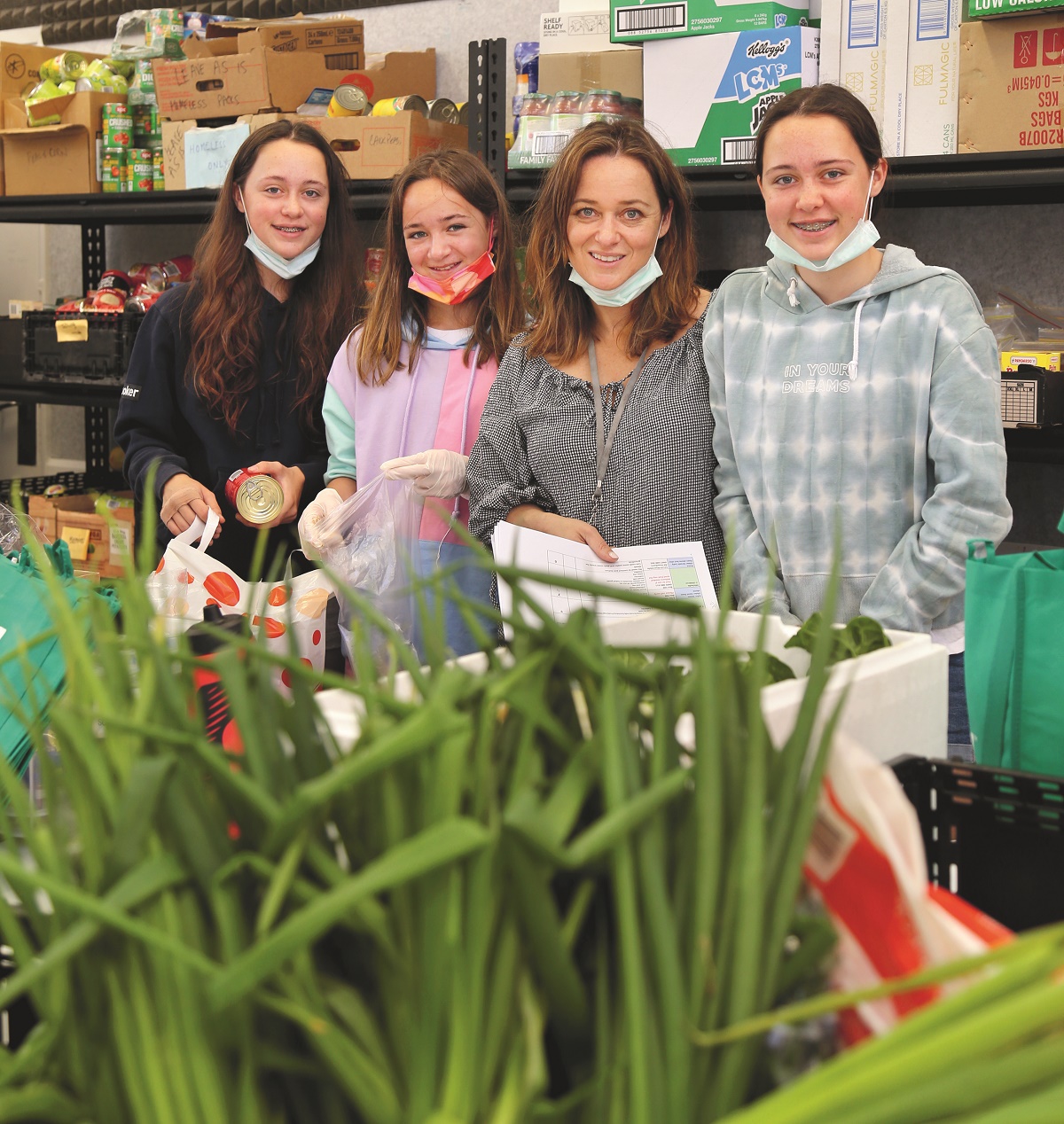
Ali Jackson with daughters Caitlin, Charlotte and Olivia at BCO in Kew.
Helping is a family affair
Like any service organisation, Boroondara Community Outreach is only as strong as its volunteers.
Thankfully, BCO has an army of people who know the true meaning of generosity and what it means to step up and help those less fortunate.
Among them is Ali Jackson, who embodies that spirit of generosity.
The day Crosslight visited, Ali was busy sorting through produce ready to be distributed to local families and individuals.
Making it a family affair, Ali had brought in her three daughters, Caitlin, Charlotte and Olivia, to help with the busy morning’s work.
Ali has been volunteering at BCO for about 12 months after a neighbor invited her to come down and lend a hand.
In the last six months, she has taken charge of organising and filling the grocery bags that go out to about 25 families, while on Thursdays she cooks up to 150 meals ready to be frozen and distributed to participants.
While her three daughters aren’t at BCO often, Ali says they are learning important life lessons when they do attend.
“They love hearing the stories of the people that we help and they have a lovely social conscience themselves,” Ali says.
“They have done charity work before and raised money for that a couple of years ago, so they are used to doing that kind of thing.
“We then thought of a way to help our local community and BCO was the perfect avenue for me to get involved in and to include the girls in that.
“They really enjoy helping out when they can.”
For many participants, access to well-cooked meals only comes through BCO, making the work of the volunteer kitchen crew massively important.
“Some of the participants don’t have access to a kitchen as such, but they do have these frozen meals that can be heated up in a microwave,” Ali says.
“As well as the meals, we will add things like fruit, milk and coffee.”
Ali says she gets an enormous amount of satisfaction from knowing she is helping people who are doing it tough.
“You know, I feel so grateful that I have the capacity to help out and make a difference,” she says.
“I find at BCO that you really get to know the people that you help and realise first-hand that what you do really makes a huge difference for them.
“I get a lot of satisfaction out of that and, for me, (there is something special) around that ability to be able to help.
“I’ve gotten to know a lot of the participants and they are just a lovely bunch of people who are doing it tough, so if I can have a chat with them, listen to their stories and brighten up their day, it means I go home very happy.”

The Bible story of the miracle of the five loaves and two fish resonates strongly with Natalia Dixon-Monu.
Bible story strikes a chord
Taking the five loaves and the two fish and looking up to heaven, he gave thanks and broke the loaves. Then he gave them to the disciples, and the disciples gave them to the people.
In the many stories contained in that remarkable document we know as the Bible, one resonates deeply with Natalie Dixon-Monu.
It’s the story of the feeding of the 5000 or the “miracle of the five loaves and two fish”.
As Natalie and her team of volunteers have worked tirelessly to provide support to so many during two years blighted by the COVID-19 pandemic and ongoing lockdowns, the story of Jesus’ feeding of the 5000 strikes a particular chord with her.
“When I reflect on the last two years, I really feel that Jesus’ story is also the story of BCO during the pandemic, on so many levels,” she says.
“On a personal level, it tells of Jesus going away to a deserted place but his followers kept on finding him and there were times during the whole pandemic that I could relate to that … every time I tried to take a break something would happen and I couldn’t leave.”
The story’s obvious sense of compassion also touches Natalie deeply.
“We know that Jesus had compassion. Yes, he wanted to go to a deserted place, but he couldn’t walk away from those needing help because they were like lost sheep and that is something I can relate to,” she says.
“We could have chosen to close down BCO when the pandemic hit but I couldn’t do that because our participants are a bit like lost sheep and I knew it was going to be really tough for them.
“Compassion is something that is bigger than us, it’s love that comes from the heart and as a point of faith, so compassion to me is very faith-based and having that heart of God is so important.”
And, in a literal sense, the coming of COVID-19 presented BCO and its staff with the same problem Jesus confronted: how do we feed, and support, those needing our help.
“When the pandemic came, it was literally a case of us saying, “okay, what have we got to feed people?”, and it was like (all we had were) five loaves and two fish,” Natalie says.
“What you see at BCO today is not what we had at the start of the pandemic, we didn’t have all of these food stocks or the commercial fridges and freezers we have now.
“I remember one of our volunteers saying to me, ‘where are we going to get the money to feed everyone?’ and I said ‘don’t worry, it will come, if it’s meant to be it will come’.
“And that is like the Bible story, where the disciples said to Jesus ‘you have to send these people away, we can’t feed them’ and here at BCO it was the same, but I said ‘no, it’s our responsibility, we have to feed them’.
Natalie also reflects on a deeper meaning within the story of the loaves and fish, and one she hopes goes to the heart of what BCO is about.
“In some ways, to me, the miracle is not necessarily the five loaves and two fish, it’s how Jesus made people sit together in groups and eat together,” she says.
“I often wonder who was in that crowd, because it must have been really disparate, some who weren’t Jewish, probably even some Roman security and others who were coming to see this person Jesus because they were curious, but they all sat down and broke bread together.
“To me that is the miracle, that Jesus forced people, who wouldn’t normally connect, to sit together and that is what happens at BCO when the broader community, which doesn’t normally connect with us, has connected in a big way.
“At times it has literally felt like the feeding of the 5000 coming to life in a big way.”
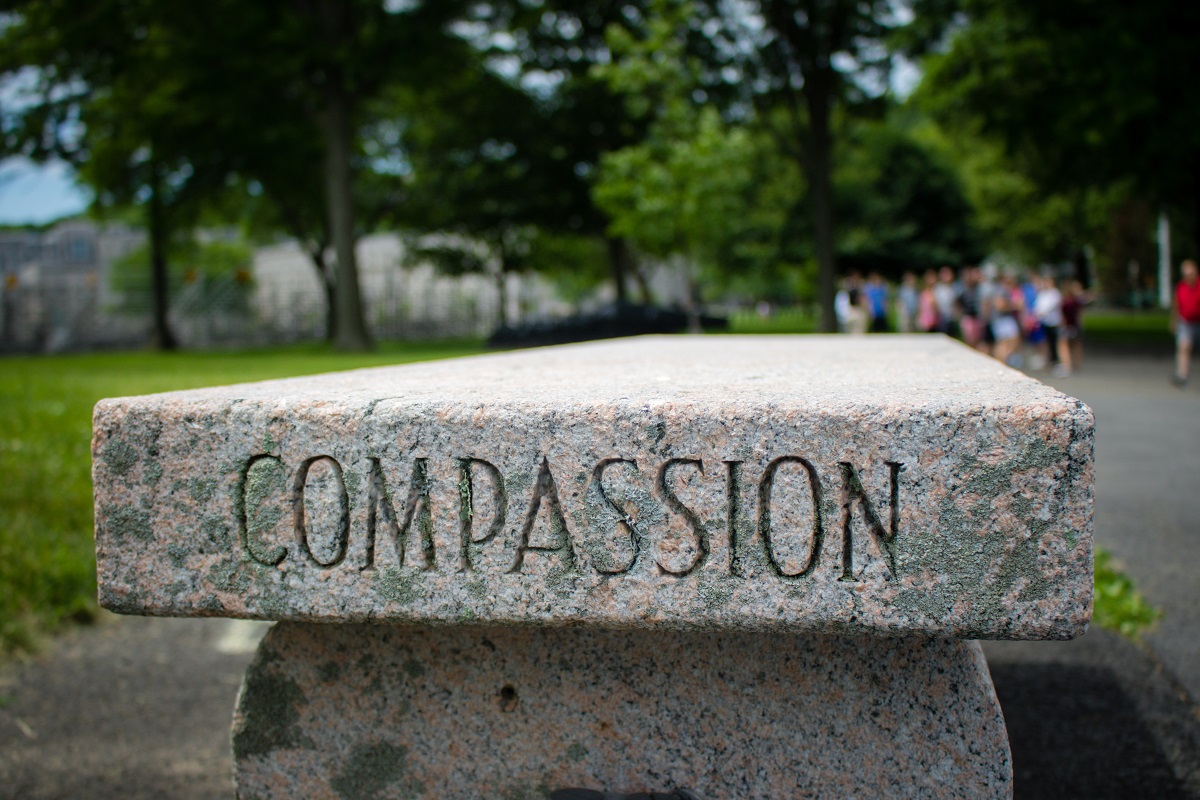
Compassion is at the heart of everything the wonderful team does at BCO.
Focusing on five assets
In 2017, British Church of England priest Samuel Wells published a groundbreaking book on social welfare called ‘For Good: The church and the future of welfare’.
In it, Samuel and co-authors Russell Rook and David Barclay put forward a transformative model for providing welfare, which breaks free of the default approach of attempting to eradicate the deficits of squalor, ignorance, want, idleness and disease.
Instead, the authors focus on fostering five assets: relationship, creativity, partnership, compassion and joy, thereby empowering people to regain control of their lives.
For Natalie Dixon-Monu, ‘For Good’ offers the perfect template for how a community service like Boroondara Community Outreach can best reach out to those who need it.
“We use ‘For Good’ as a resource here because Samuel talks about the fundamental pillars of creativity and joy (in providing a welfare-based approach),” Natalie says.
“What he also talks about is the difference between assets and deficits, and the fact that the social welfare system is often based around eradicating deficits.
“So, someone doesn’t have food so we give them food, or someone doesn’t have a house so we get them a house, but there are also things called assets, which are really the business of the church, around providing hope and joy and compassion, and there is a recognition that if you only focus on the deficits it’s not really transformative.
“Yes, it’s nice to have a home, but you could still be completely joyless within it and, in fact, you can be homeless but have more joy, and it’s the lack of joy that kills people.
“So if you concentrate only on eradicating deficits it becomes a soulless business and that’s what we don’t do here at BCO.
“Yes, we provide food, but we also provide hospitality because that is about compassion and respectful engagement with somebody, and that’s the asset.
“There will be long-term deficits in people’s lives and some of that is not fixable and that means it’s the assets that keep people going.
“People will tell you it’s the loneliness that kills them the most, not the lack of food.”
That word “joy” crops up often in conversations with Natalie and that’s because, she says, it’s a simple three-letter word that can make the world of difference in someone’s life.
“I remember we put together a care package, containing various items, for participants as part of Mental Health Week,” she recalls.
“As part of that I contacted a florist in Hawthorn and bought 400 single-stem roses and we wrapped up every single one of them and put one in each care package and, what came back from that, was the number of people who just loved getting that flower.
“One person said to me ‘I don’t know if I’ve received a flower before’ and it was just wonderful to be able to do that, and that comes back to that concept of joy.
“Sometimes we will (do something else) like put the speakers outside here at BCO and put on some Elvis or Abba and I will make everyone dance, so people might be walking past and suddenly they are hearing Dancing Queen blasting from the speakers and they look down the laneway and see five or six of us out there just dancing away, and someone will say ‘oh God, I really needed that’.
“It’s all about creating a bit of joy, a bit of life.
“I think a good day at BCO is when someone has come here not feeling good and they leave feeling that they have been engaged with as a human being, been treated with dignity and respect and even had a bit of joy.”


